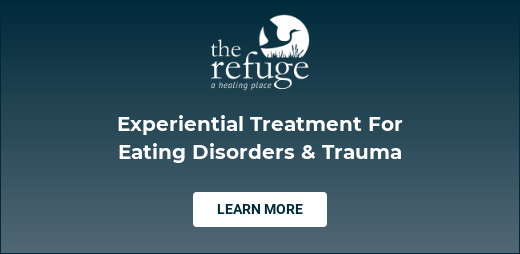- Calls to this hotline are currently being directed to Within Health, Fay or Eating Disorder Solutions
- Representatives are standing by 24/7 to help answer your questions
- All calls are confidential and HIPAA compliant
- There is no obligation or cost to call
- Eating Disorder Hope does not receive any commissions or fees dependent upon which provider you select
- Additional treatment providers are located on our directory or samhsa.gov
‘Quarantine 15’ Is No Joke for People with Eating Disorders

Sponsored By: The Refuge – A Healing Place
We’ve all heard about the Freshman 15, the belief that first-year college students will put on 15 pounds as they adjust to a new environment, experience more independence, and often have access to all types of unhealthy food 24/7 in their introduction to campus life. Even though that’s generally been debunked, it’s a myth that has had a significant shelf-life [1]. The latest weight-related phrase that’s gained steam is the so-called Quarantine 15.
The ‘Quarantine 15’
As we all navigate increased isolation, restricted movement, less access to amenities like gyms and fitness routines, and a lot more time to sit at home and eat (or drink) without immediate repercussions, adding a little weight became somewhat of a running joke across the internet over the past nine months.
The reality seemed to be in line with that online riffing. According to a summer survey of 2,000 American adults by Nutrisystem, 76 percent of respondents gained weight — up to 16 pounds — between mid-March and July [2].
But what began as a hashtag and meme on social media isn’t funny for many people who have struggled with eating disorders. Even for those not actively practicing disordered eating, thoughts of weight gain or weight loss can remain in the back of their mind.
Call The Refuge – A Healing Place for Help 855-580-9684
With so much focus at the beginning of the pandemic on a potential lack of access to food, stockpiling and hoarding specific items became common practices. As we welcome a new year, where many people focus their resolutions around eating healthier, becoming more active, or losing a few pounds, weight is once again a hot topic and a potential trigger for those with a history of eating disorders.
It would be easy for anyone, much less someone who is struggling with an eating disorder, to get trapped in a cycle of guilt and shame during this time where almost all of us are less active. Those emotions can be major stumbling blocks on the path to having a better relationship with food.
“Even if you have gained weight, even if you don’t love what you see in the mirror, even if you are working on a better relationship to food and body, the shame and the guilt that goes on top of it has never served anyone,” licensed psychotherapist and behavior change specialist Eliza Kingsford told CNET in a recent interview [3]. “No one has ever shamed themselves into a better job, or shamed themselves into being a better parent, or shamed themselves into being a better partner.”
Possible Solutions
 Going from a busy schedule or routine to a lack of structure and more free time can leave anyone in a vulnerable spot. Instead of worrying about the weight that you may have already gained during quarantine, it’s helpful to develop a three-step plan that allows you to focus more on your mental well-being and re-establish a better relationship with food.
Going from a busy schedule or routine to a lack of structure and more free time can leave anyone in a vulnerable spot. Instead of worrying about the weight that you may have already gained during quarantine, it’s helpful to develop a three-step plan that allows you to focus more on your mental well-being and re-establish a better relationship with food.
1. Take stock of your social media. Spending less time in person with family, friends, or coworkers often leads to spending more time scrolling around online. That’s not typically a recipe for good mental health, particularly if you’re following accounts that lead you to make body image comparisons and make you feel inadequate. Especially if you’ve gained the Quarantine 15.
Take a look at how long you’re spending on your phone, on Instagram, or on Facebook. Write down what’s triggering to you. Unfollow, hide, or mute, the accounts that are. Even after you’ve curated your feed, set some limits on how much media you allow yourself to consume.
2. Plan your meals. You deserve to eat good, healthy food, and you can ensure that your body is getting the nutrients it needs by creating a plan of action. Find recipes that you’re comfortable with and go shopping for all the ingredients at once.
If it works best in your schedule, do your cooking (or at least the elements that can be done in advance) at the same time so that you’ll have healthy meals to eat throughout the week. From there, eat at regular intervals. Having set times for breakfast, lunch, and dinner will tell your body what to expect.
3. Maintain a sleep schedule. Sleep helps with emotion regulation, which is a significant aspect of recovering from an eating disorder. Having a sleep routine also generally promotes better physical and mental health.
That not only means getting seven or eight hours a night, but getting the right hours. Going to bed at 10 p.m. one night but staying up until 3 a.m. the next can throw off your body and your energy. Waking up refreshed sets you up for success each morning.
It’s also best to avoid bright screens before bedtime, both for your eyes and your mental well-being. After all, even though it was born from a hashtag, filtering out all the noise around Quarantine 15 can benefit your continued recovery from an eating disorder.
Resources:
[1] Mihalopoulos, N., Auinger, P., & Klein, J. (2008, Sept. 9). The Freshman 15: Is it real? J Am Coll Health. 56(5): 531-533. Retrieved from: https://www.ncbi.nlm.nih.gov/pmc/articles/PMC2532948/pdf/nihms-63604.pdf. [2] SWNS Digital. (2020, July 6). Americans have gained up to 16 pounds while quarantining. Retrieved from: https://www.swnsdigital.com/2020/07/americans-have-gained-up-to-16-pounds-while-quarantining/. [3] Livingston, M. (2020, Aug. 6). Gained the Quarantine 15? How to stop shaming yourself for pandemic weight gain. CNET. Retrieved from: https://www.cnet.com/health/stop-body-shaming-yourself-for-the-quarantine-15/.About Our Sponsor:
 The Refuge, A Healing Place is a nationally respected provider of treatment for adults who have been struggling with substance use disorders, the effects of trauma, eating disorders, and mental health concerns. Located on 96 acres amid the beautiful Ocala National Forest in Ocklawaha, Florida, The Refuge’s campus is an ideal treatment environment for clients to step away from everyday stress to focus on their health. Treatment options include residential care and a partial hospitalization program, along with medical detoxification, a relapse prevention program, and four-day intensive retreats that incorporate family and friends.
The Refuge, A Healing Place is a nationally respected provider of treatment for adults who have been struggling with substance use disorders, the effects of trauma, eating disorders, and mental health concerns. Located on 96 acres amid the beautiful Ocala National Forest in Ocklawaha, Florida, The Refuge’s campus is an ideal treatment environment for clients to step away from everyday stress to focus on their health. Treatment options include residential care and a partial hospitalization program, along with medical detoxification, a relapse prevention program, and four-day intensive retreats that incorporate family and friends.
The opinions and views of our guest contributors are shared to provide a broad perspective on eating disorders. These are not necessarily the views of Eating Disorder Hope, but an effort to offer a discussion of various issues by different concerned individuals.
We at Eating Disorder Hope understand that eating disorders result from a combination of environmental and genetic factors. If you or a loved one are suffering from an eating disorder, please know that there is hope for you, and seek immediate professional help.
Published January 13, 2021, on EatingDisorderHope.com
Reviewed & Approved on January 13, 2021, by Jacquelyn Ekern MS, LPC

The EatingDisorderHope.com editorial team comprises experienced writers, editors, and medical reviewers specializing in eating disorders, treatment, and mental and behavioral health.


